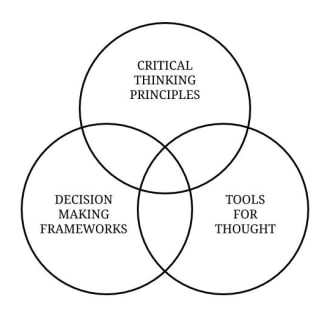
10+ Best Articles on Mental Models
The most useful articles on mental models from around the web, curated by thought leaders and our community.
Refind focuses on timeless pieces and updates the list whenever new, must-read articles or videos are discovered.
Top 5 Mental Models Articles
At a glance: these are the articles that have been most read, shared, and saved on mental models by Refind users in 2024 so far.
Videos
Watch a video to get a quick overview.
The Sunk Cost Fallacy 😐
🎙 If you liked this, you might like my weekly newsletter where I share actionable productivity tips, practical life advice, and high-quality insights from a...
What is ...?
New to #mental models? These articles make an excellent introduction.
An Introduction to Mental Models
Discover how the smartest people in the world use a latticework of mental models to make better decisions, avoid problems, and achieve better results.
How to ...?
How to think better
Learn how to think better with a guide on decision-making frameworks, cognitive biases, mental models, and tools for thought.
«metacognitive skills allow people to bring their thought processes to the foreground, so they can be analysed, and potentially improved.»
How to evaluate the validity and reliability of your mental models
Mental models are shortcuts for reasoning. They are a set of ideas and beliefs that we consciously or unconsciously form based on our experiences to shape our representation of how the world works.…
«In scientific research, validity is the extent to which a concept is accurately measured. To put it simply: are we measuring the right thing?»
Short Articles
Short on time? Check out these useful short articles on mental models—all under 10 minutes.
Thinking Models: 5 Little-Known Concepts to Navigate the World
A reflection on five thinking models to help you navigate the world of problem-solving and decision-making. If you know their limitations.
«The SARA Model is a structured approach to problem-solving. The acronym SARA stands for Scanning, Analysis, Response and Assessment»
Counterfactual Thinking: The magic of asking 'what if' (Wayfinder #10)
Welcome back to the tenth issue of Wayfinder, your fortnightly compass for navigating life’s toughest decisions. Have you ever caught yourself thinking, "If only I had taken that job, moved to that…
«Counterfactual thinking revolves around the very human act of imagining alternative scenarios to events that have already occurred — a mental revisiting of "what might have been".»
Three Simple, Brilliant Mental Models for Better Collaboration
To avoid pitfalls in group decision-making and problem-solving
«The Abilene Paradox is a common phenomenon where a group collectively agrees on a course of action that goes against the preferences or beliefs of each individual in the group»
The Dangers of Survivorship Bias
The Curiosity Chronicle has quickly become one of the most popular newsletters for growth-minded individuals in the world. Each week, subscribers receive a deep dive that covers topics ranging from…
The Science of Getting Started: Activation Energy and Why We Need It
Starting is hard. Let's face it, not everyone wakes up with a fire in their belly and a hunger for productivity. Some of us need a little extra push to get going, whether it's a cup of coffee, a quick…
«Visualising your desired outcome and focusing on the positive impact of your actions can also provide motivation and increase your internal drive.»
Long Articles
These are some of the most-read long-form articles on mental models.
The Map Is Not the Territory
The map of reality is not reality. Even the best maps are imperfect. That's because they are reductions of what they represent. If a map were to represent the territory with perfect fidelity, it would…
«A model might show you some risks, but not the risks of using it. Moreover, models are built on a finite set of parameters, while reality affords us infinite sources of risks.»
Ten Mental Models for Learning
Ten central ideas to keep in mind whenever you need to learn anything new.
«How much you’re able to learn depends on what you already know. Research finds that the amount of knowledge retained from a text depends on prior knowledge of the topic»
The Pursuit of Worldly Wisdom
Charlie Munger explains how worldly wisdom can help you go further and faster than experts. You don't need to outwork if you can outsmart.
«From each discipline the thoughtful person draws significant mental models, the key ideas that combine to produce a cohesive understanding»
Mental Models I Find Repeatedly Useful
Update: Since this post came out, I co-authored a book about it called Super Thinking. Get notified about book updates here (currently…
«you can learn through coursework, mentorship, or first-hand experience.»
A Lesson on Elementary Worldly Wisdom
Charlie Munger's famous lecture on the art of stock picking as a subdivision of the art of worldly wisdom.
«So occasionally, scaling down and intensifying gives you a big advantage. Bigger is not always better.»
What is Refind?
Every day Refind picks the most relevant links from around the web for you. Picking only a handful of links means focusing on what’s relevant and useful.
How does Refind curate?
It’s a mix of human and algorithmic curation, following a number of steps:
- We monitor 10k+ sources and 1k+ thought leaders on hundreds of topics—publications, blogs, news sites, newsletters, Substack, Medium, Twitter, etc.
- In addition, our users save links from around the web using our Save buttons and our extensions.
- Our algorithm processes 100k+ new links every day and uses external signals to find the most relevant ones, focusing on timeless pieces.
- Our community of active users gets the most relevant links every day, tailored to their interests. They provide feedback via implicit and explicit signals: open, read, listen, share, mark as read, read later, «More/less like this», etc.
- Our algorithm uses these internal signals to refine the selection.
- In addition, we have expert curators who manually curate niche topics.
The result: lists of the best and most useful articles on hundreds of topics.
How does Refind detect «timeless» pieces?
We focus on pieces with long shelf-lives—not news. We determine «timelessness» via a number of metrics, for example, the consumption pattern of links over time.
How many sources does Refind monitor?
We monitor 10k+ content sources on hundreds of topics—publications, blogs, news sites, newsletters, Substack, Medium, Twitter, etc.
Can I submit a link?
Indirectly, by using Refind and saving links from outside (e.g., via our extensions).
How can I report a problem?
When you’re logged-in, you can flag any link via the «More» (...) menu. You can also report problems via email to hello@refind.com
Who uses Refind?
450k+ smart people start their day with Refind. To learn something new. To get inspired. To move forward. Our apps have a 4.9/5 rating.
Is Refind free?
Yes, it’s free!
How can I sign up?
Head over to our homepage and sign up by email or with your Twitter or Google account.
Keep Learning
Get the big picture on your favorite topics.












